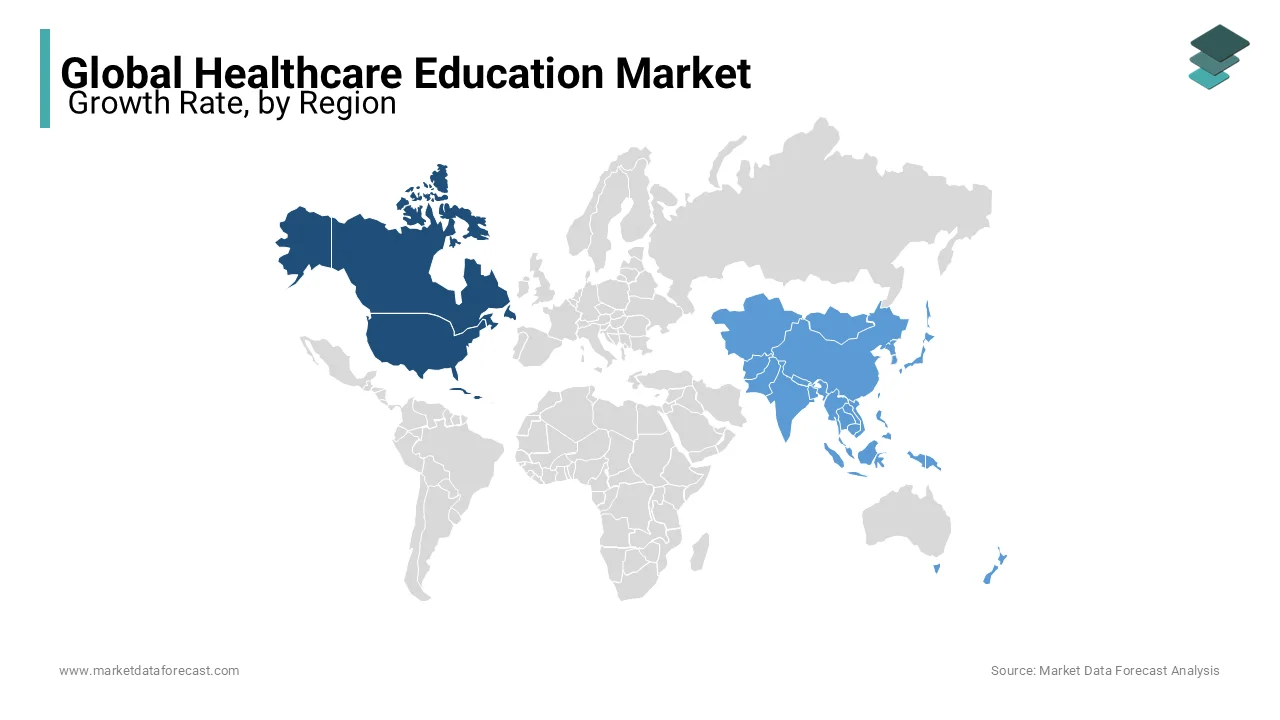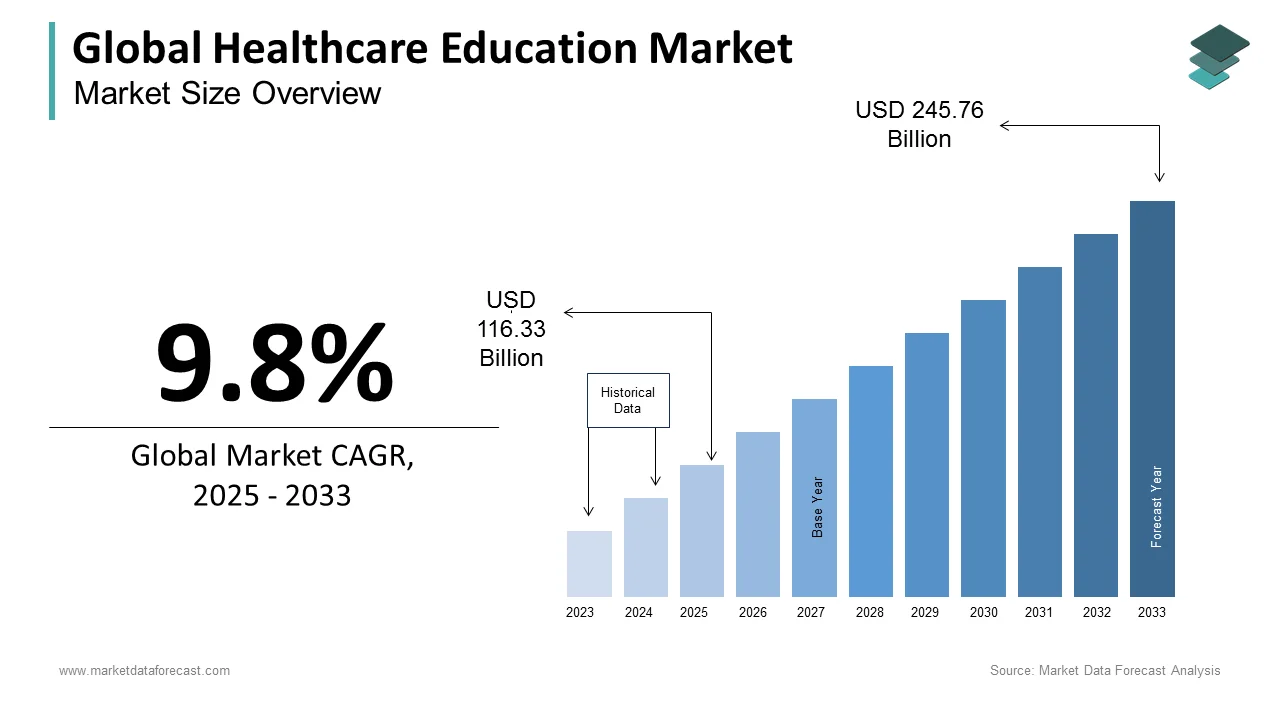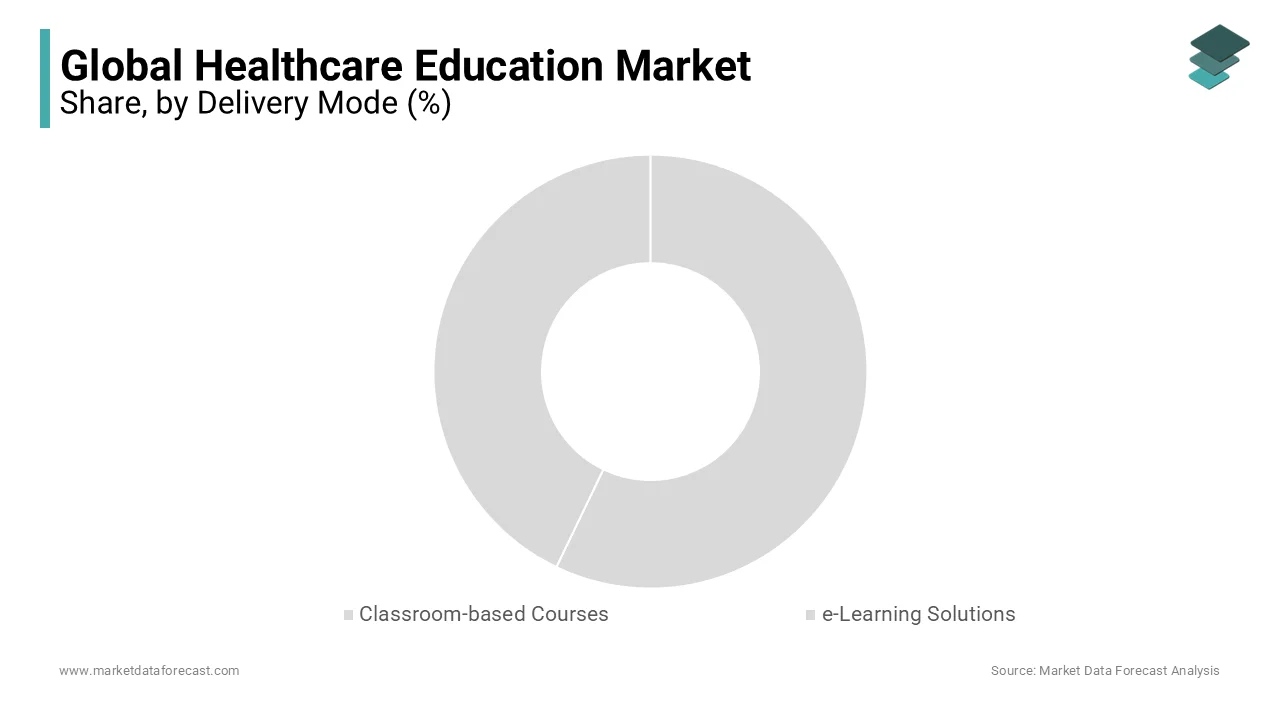Global Healthcare Education Market Size, Share, Trends & Growth Forecast Report By Provider, Delivery Mode, Application, End-user, and Region (North America, Europe, Asia-Pacific, Latin America, Middle East and Africa), Industry Analysis From 2025 to 2033.
Global Healthcare Education Market Size
The size of the global healthcare education market was worth USD 105.95 billion in 2024. The global market is anticipated to grow at a CAGR of 9.8% from 2025 to 2033 and be worth USD 245.76 billion by 2033 from USD 116.33 billion in 2025.
The World Health Organization (WHO) defines health education as "any mix of learning opportunities intended to help individuals and societies better their health, whether by increasing awareness or changing attitudes." Thus, health education is a mechanism for promoting health promotion and disease prevention services in which individuals or groups are educated about environmental health, physical health, social health, emotional health, intellectual health, oral health, and sexual and reproductive health education. The programs involved in healthcare education are conferences, forums, workshops, seminars, webinars, and classes aimed at health security, championing favorable health protection policies among the public and policymakers.
MARKET DRIVERS
The changing developments in the healthcare industry are the primary drivers of the global healthcare education market.
Nowadays, technology in healthcare is adapting, and with the evolving technology, professionals must be prepared. As with the transition from conventional hospital to ambulatory medicine, delivering services in a much shorter amount of time necessitates improvements in data, with all content, including both patient literacy and medical records, being digital demands trained professionals. Also, healthcare technologies, such as diagnostics, laboratory investigations, medical discharge records, and hospital admissions, necessitate specialized personnel. Moreover, automation of healthcare facilities where many other computer networks and software applications are used necessitates staff training to improve service efficiency. Besides this, to use this system, public healthcare organizations require doctors, consultants, and medical specialists to be certified in continuing medical education programs (CME). As a result, there is a greater need for healthcare education.
The growing demand for e-learning also propels the growth of the global healthcare education market.
There are some disadvantages to the traditional method of learning. The cost of building and operating physical training facilities is high and meet changing demands due to rapidly changing developments in disease therapies, medical technology, and medications is difficult. Many of these challenges are solved by eLearning, allowing physicians and other healthcare practitioners to take classes at their rate. This online approach provides unprecedented access to new research approaches such as speed customization and collaborative learning through videos and audio that are also cost-effective. Since online learning has no limits, anybody can use it to learn anytime and from any place. CME services in online and classroom settings enable medical professionals to pursue instruction that suits their busy schedules. Non-medical workers can also benefit from an e-learning approach that is convenient and does not interfere with their work.
Government efforts to introduce health education programs further drive the global healthcare education market growth. The government-launched programs aid in the improvement of health literacy. For instance, in March 2020, the School Health Programme (SHP) under Ayushman Bharat was initiated in partnership with the Ministries of Health and Family Welfare and Human Resource Development. Under the scheme, teachers act as “Health and Wellness Ambassadors” and circulate various key details by organizing culturally responsive activity-based sessions for one hour every week for weeks a year to promote joyful learning. In addition, the San Luis Valley Area Health Education Center (SLVAHEC) implemented the SLV N.E.E.D. (Naloxone Education Empowerment Distribution Program) in 2017, which provided educational sessions on addressing opioid abuse to providers and community stakeholders. The Eastern Shore Area Health Education Center (AHEC) implemented the Oral Health Outreach Program, which provides dental education and outreach to community children, in 2015.
MARKET RESTRAINTS
However, the expansion of the global healthcare education market is hampered by unreliable and expensive facilities. Building classrooms and other structures is costly and has become complicated with emerging technologies. Furthermore, there are numerous places where people have internet access issues, which affect online health education. However, with government assistance, the situation is improving.
REPORT COVERAGE
|
REPORT METRIC |
DETAILS |
|
Market Size Available |
2024 to 2033 |
|
Base Year |
2024 |
|
Forecast Period |
2025 to 2033 |
|
Segments Covered |
By Providers, Delivery Mode, Application, End-User, and Region |
|
Various Analyses Covered |
Global, Regional & Country Level Analysis, Segment-Level Analysis; DROC, PESTLE Analysis, Porter's Five Forces Analysis, Competitive Landscape, Analyst Overview of Investment Opportunities |
|
Regions Covered |
North America, Europe, APAC, Latin America, Middle East & Africa |
|
Market Leader Profiled |
SAP, Adobe Inc., Infor, Oracle, HealthStream, HealthcareSource, Elsevier, Articulate, PeopleFluent, ADP, GE Healthcare, Trivantis Corporation, Cerner, Koninklijke Phillips, Siemens Healthineers, Coursera, IBM, Academy of Medicine of Richmond, PfizerWebinar and Central Michigan University College of Medicine. |
SEGMENTAL ANALYSIS
By Providers Insights
The universities and academic centers segment held the largest share of the healthcare education market in 2024 and the domination of the segment is likely to continue throughout the forecast period. The shortage of healthcare workers required to provide high-quality care significantly contributes to this segment's large share.
By Delivery Mode Insights
The market for healthcare education solutions was dominated by the e-learning solutions segment in 2024, and the segmental lead is anticipated to continue during the forecast period. Greater flexibility in training schedules, increased accessibility, lower costs, better access to educational resources, and numerous new updates contribute to the domination. Another advantage of e-learning is that students may sample courses before paying for them, allowing them to complete a whole class before paying for certification. Of course, these advantages apply to all types of online learning, but they are essential for medical professionals seeking continuous education.
By Application Insights
The solutions segment had the major share of the global market in 2024 and is expected to be dominated by the cardiology segment, which also had the most significant share of the market. The global market is expected to grow due to an increase in the number of initiatives taken by CME providers and key players to organize CME (Continuing medical education) activities, as well as an increase in the number of grants from government bodies to help young professionals in the field of cardiology access quality training.
By End-User Insights
Based on End-User, Physicians dominate the Healthcare Education Market.
REGIONAL ANALYSIS

During the forecast period, the North American market is expected to grow at a CAGR of 9.7 percent, owing to measures done by industry players and regional governments to increase the number of medical schools and advance the healthcare sector. The expansion of the North American area is fuelled by an increase in the number of CME programs and significant governmental and private sector expenditures on developing young healthcare professionals. Continuing medical education (CME) solutions are widely recognized by physicians and non-physicians who desire to stay current with rapidly evolving technology. The healthcare education solutions market in the area is fuelled by the availability of suitable programs to train healthcare staff for emerging technology. In addition, Healthcare education solutions are in high demand due to initiatives by public and private healthcare institutions in the region to prepare healthcare staff for modern technology.
In the next few years, Asia Pacific is likely to become a prominent area in the healthcare education solutions market. Rapid economic development in the region's rising nations, including the growth and modernization of healthcare, are some of the primary reasons driving the region's healthcare education solutions market. As a result, laboratory technicians, hospital floor supervisors, nurses, and operating room personnel in modern healthcare institutions in the region are now tech-savvy. In addition, the surge in demand for online learning, rising preference for ongoing medical education due to strict regulatory demands, and the use of modern technologies to meet training demands all contribute to the region's market growth.
KEY MARKET PLAYERS
Some of the notable market players operating in the global healthcare education market profiled in this report are SAP, Adobe Inc., Infor, Oracle, HealthStream, HealthcareSource, Elsevier, Articulate, PeopleFluent, ADP, GE Healthcare, Trivantis Corporation, Cerner, Koninklijke Phillips, Siemens Healthineers, Coursera, IBM, Academy of Medicine of Richmond, PfizerWebinar and Central Michigan University College of Medicine. These players are majorly focusing on key strategies like launch, acquisition, and partnerships.
RECENT HAPPENINGS IN THE MARKET
- In April 2021, Keres announced a health education collaboration with 'The Voice' recipient Chevel Shepherd. The collaboration aims to raise awareness of Keres' No More New Mexico young adult initiative, which connects teenagers in the state with tobacco-free education and services.
- In November 2020, Rishihood University announced the forthcoming opening of the Rishihood School of Healthcare. Under the allied healthcare domain, the School of Healthcare will offer various UG & PG degree programs, including B.Sc. Cardiovascular Technology, Medical Laboratory Technology, and MBA in Healthcare Management.
MARKET SEGMENTATION
This research report on the global healthcare education market has been segmented and sub-segmented based on providers, delivery mode, applications, end-user, and region.
By Providers
- OEM/Pharmaceutical and Medical Device Companies
- Universities and Academic Centers
- Continued Medical Education Providers
- Learning Management Systems Providers
- Education Platforms
- Professional Associations
- Medical Simulation
By Delivery Mode
- Classroom-based Courses
- e-Learning Solutions
By Application
- Cardiology
- Internal Medicine
- Radiology
- Neurology
- Pediatrics
- Academic Education
- Other Applications
By End-User
- Physicians
- Non-Physician Healthcare Professional
- Students
By Region
- North America
- Europe
- Asia-Pacific
- Latin America
- The Middle East and Africa
Frequently Asked Questions
Does this report include the impact of COVID-19 on the healthcare education market?
The global healthcare education market size is expected to be worth USD 245.76 billion by 2032.
Which region led the healthcare education market in 2024?
Geographically, the North American region showcased domination in the global healthcare education market in 2024.
Who are the major players in the healthcare education market?
SAP, Adobe Inc., Infor, Oracle, HealthStream, HealthcareSource, Elsevier, Articulate, PeopleFluent, ADP, GE Healthcare, Trivantis Corporation, Cerner, Koninklijke Phillips, Siemens Healthineers, Coursera, IBM, Academy of Medicine of Richmond, PfizerWebinar and Central Michigan University College of Medicine are some of the notable players in the global healthcare education market.
Related Reports
Access the study in MULTIPLE FORMATS
Purchase options starting from
$ 2500
Didn’t find what you’re looking for?
TALK TO OUR ANALYST TEAM
Need something within your budget?
NO WORRIES! WE GOT YOU COVERED!
Call us on: +1 888 702 9696 (U.S Toll Free)
Write to us: sales@marketdataforecast.com


